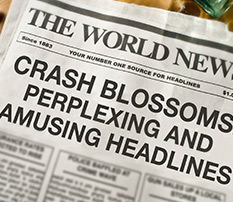Crash Blossom: Words We're Watching

We've all experienced this: while scanning the latest news headlines, one pulls us up short not because of the story behind it, but the words in it. A headline blares, "Whale watching boat carrying 27 sinks," and you wonder: why is the whale watching a boat, and how can you tell that it's watching the boat? And why was the boat carrying 27 sinks?
You've encountered what's called a "crash blossom": a headline that is ambiguous because of its wording or punctuation (or absence thereof). The above crash blossom would have been easier to parse with a hyphen between "whale" and "watching" and perhaps by substituting "capsizes" for "sinks."
While crash blossoms themselves are as old as newspapers, the word only dates back to 2009, when editor Mike O'Connell saw an ambiguous headline that appeared in the newspaper Japan Today — "Violinist Linked to JAL Crash Blossoms" — and wondered in the Testy Copy Editors forum, "What's a crash blossom?" The word for these ambiguous statements was born, and examples of crash blossoms began to flood the linguistics blog, Language Log. Like eggcorns, crash blossoms test a reader's sprachgefühl, or sense of language, and are just fun. A few choice crash blossoms from recent years:
A Parade Hailing Russia’s World War II Dead and Marching Further From the West
More Midwest Twisters: Why Is Oklahoma Tornado Vexed?
Scientists count whales from space



















